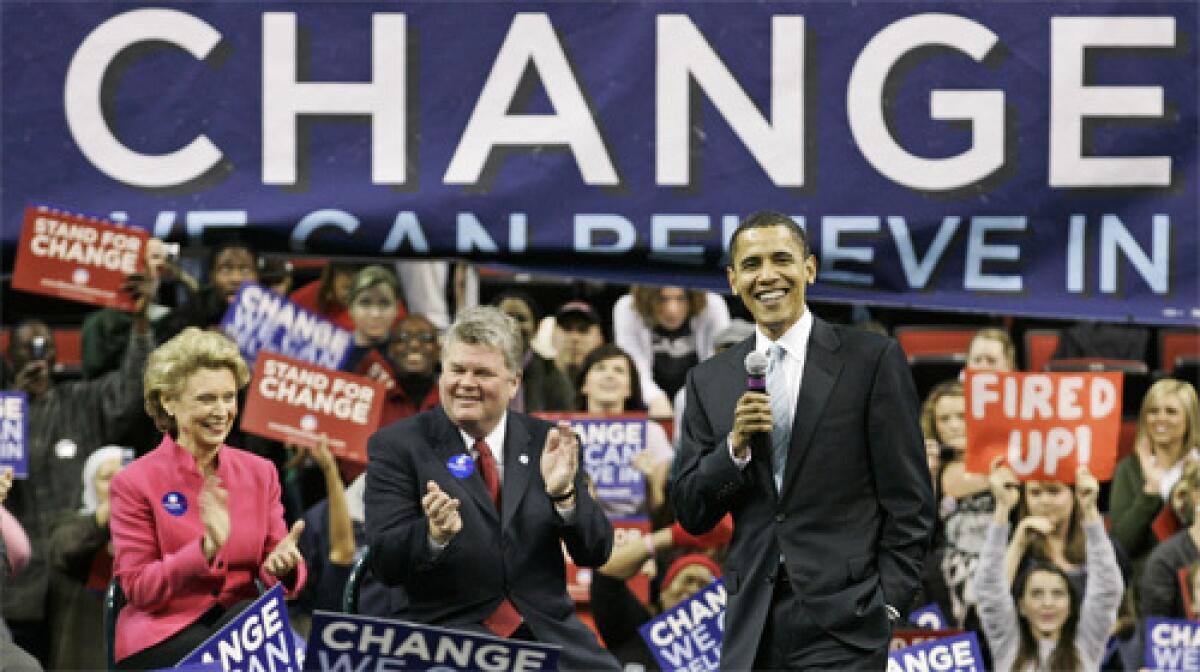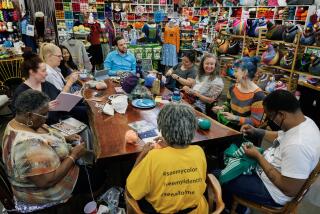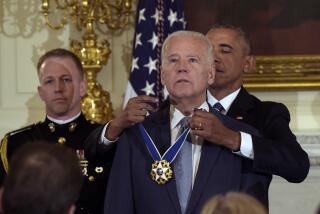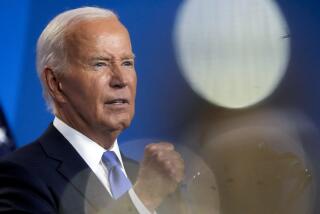Grass-roots organizing gives Obama an edge

Beyond the final tally of votes and delegates, Super Tuesday turned out to be a historic moment: An African American candidate rooted in the racially charged urban politics of Chicago sweeping largely white heartland states from North Dakota and Minnesota to Kansas and Idaho.
And the apparent key to Barack Obama’s success in those states could prove a major asset in four more states selecting delegates today -- as well as in Texas and other potentially pivotal states that will vote in the weeks just ahead.
What gave Obama an edge, his strategists say, was a heavy investment in grass-roots organizing, coupled with support from local politicians and community leaders who lent their personal credibility to a relatively little-known Illinois senator who might have seemed worlds away from the lives of local voters.
The system has been particularly effective in caucus states; thus far, Obama has won seven. He is poised to extend the string today when Nebraska and Washington state, as well as the Virgin Islands, hold caucuses. A fourth state, Louisiana, is holding a primary, but its large African American population could help give Obama a clean sweep.
On Tuesday, Obama’s native state of Hawaii holds a caucus, and three other primaries take place in Virginia; Washington, D.C.; and Maryland, jurisdictions where large African American populations give Obama an advantage.
All campaigns try to build grass-roots organizations, especially those of charismatic challengers like Obama. But those efforts, which often rely on neophyte volunteers whose enthusiasm exceeds their political skills, often fade in the stretch.
Obama sought to avoid that problem by organizing intensive regional training camps designed to help his volunteers function with near-professional proficiency.
The costly effort began in the spring of 2007, in part to counter the organizational resources of unions and Democratic Party organizations that were largely committed to Obama’s Democratic rival, Sen. Hillary Rodham Clinton of New York. The precinct-level operations were to employ theories of community organizing Obama practiced in Chicago before getting into electoral politics.
Last April, Obama’s national field director, Cuauhtemoc “Temo” Figueroa, wrote an internal memo titled “Turning Enthusiasm into Organization,” a blueprint for turning Obama’s rock star popularity into a more professional and sustained operation.
The purpose, Figueroa wrote, is to provide supporters with the tools to create “self-sufficient, interdependent teams that take responsibility for all aspects of a campaign within their congressional district.”
Thousands of Obama volunteers have gone through training to learn the basics, including how to set up phone banks and outreach operations. Trainers encourage volunteers to set up quasi-independent local offices that tailor a personalized door-to-door pitch based on local circumstances or the latest campaign development.
For example, in Latino precincts of Denver, the Obama campaign was concerned about a whispering campaign suggesting that Obama was a Muslim. Campaign workers focused on distributing literature in Spanish talking about Obama’s commitment to Christ and his church membership in Chicago.
In Colorado and California, the campaign stressed the importance of Obama’s position in favor of issuing drivers licenses to illegal immigrants, contrasting it with Clinton’s waffling on the topic. In Minnesota’s iron range, door knockers discussed Obama’s past work with steelworkers.
Last week, across the wind-swept plains of overwhelmingly rural and white North Dakota, the result was on display as a small army of Obama campaigners, led by 10 full-time professional organizers, began going door to door.
“We have never seen that kind of on-the-ground investment by a presidential campaign here,” said Rick Gion, a spokesman for the state Democratic Party. “Door-knocking in the frigid North Dakota winter really makes an impression.”
Next door, in northern Minnesota, the towns of the largely worn-out Mesabi Iron Range seemed unpromising territory for Obama. Economically depressed and filled with blue-collar union members and retirees, they have almost all the characteristics of communities where Clinton has run strong.
And, with the backing of government employees’ and teachers’ unions as well as such legendary Minnesota names as former Vice President Walter F. Mondale, Clinton ran well in “the Range.”
But Obama ran stronger. He had a larger field operation and the backing of local politicians who were closer to these voters than their more famous colleagues. Among them were state Rep. Tony Sertich of Chisholm, the majority leader of the State House.
Sertich and other surrogates made a point of describing how, before Obama started at Harvard Law School, he worked with laid-off steelworkers to make sure they got pension and health care benefits.
“It really resonated,” Sertich said. “He dealt with a lot of the same issues that we do.”
California was the one dark spot for Obama’s field operatives. They had made an all-out effort in the Central Valley and Riverside County but failed to stop a tidal wave of Latino and other support for Clinton.
The setback was all the more disappointing because Figueroa, responsible for grass-roots organizing across the country, had virtually taken up residence in the Central Valley and the Inland Empire in the days before Super Tuesday.
“I was a California dreamer,” Obama’s deputy campaign manager, Steve Hildebrand, said, explaining the decision to pump resources into some California counties.
Obama’s strategists say they learned important lessons in California, especially the need to buttress field operations with appearances by the candidate and credible local surrogates.
Those lessons are likely to be applied for the key contest March 4 in Texas, where Obama’s vaunted field organization will face a huge Latino population with close ties to the Clintons, as it did in California.
Right after Super Tuesday, many of Obama’s top organizers from the Iowa, Nevada and Colorado caucuses headed to Texas, whose primary includes some features of a caucus. The campaign quickly announced plans to open 10 offices statewide.
More to Read
Sign up for Essential California
The most important California stories and recommendations in your inbox every morning.
You may occasionally receive promotional content from the Los Angeles Times.








